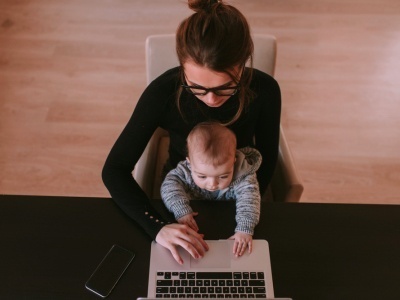Can women juggle the demands of motherhood whilst still progressing at work? Research conducted by the Universities of Bristol and Essex (2019) suggests that many don’t.
Whether it’s the percentage of women in full-time or self-employed roles after childbirth (27.8%) or the number of women promoted or moving to a better job in the 5 years following childbirth (13%), the picture isn’t great – women’s careers are suffering because of becoming a parent.
So how can women continue to succeed and grow at work, whilst managing the additional challenges of parenthood? For those women who do want to return to work and still feel ambitious and hungry to progress, their experiences of returning to work can have an enormous impact on whether they feel empowered and positive or end up feeling occupationally stuck. Employers have a significant role to play in shaping these experiences for the good or bad.
What can employers do, beyond the legal expectations, to make the return to work experience a positive one? As an experienced coach, I’ve collated some of the stories and lessons from the women I’ve worked with that have enabled them to successfully return to work.
First and foremost, help the women who are leaving to go on maternity leave feel excited about the possibilities that will exist when they return. Take the time to explore which parts of their role they are thriving in and enjoying and which parts of their role they struggle with before they go on maternity leave. This could be a good opportunity to re-think the structure of their role before they return and identify things that could go to other people. It’s also a great reminder when they return of the things they enjoyed and excelled at – crucial when someone is in the early days of returning and may be struggling with issues around confidence, guilt, and self-belief.
Take the time to talk about career development and aspirations when someone returns to work. Make it clear that you still see them as bright, ambitious, and successful women and that you are interested in their progression. This will help their self-belief and quickly dispel the possibility of them feeling occupationally stuck.
Don’t just hand over someone’s old role to them when they come back and expect them to get on with it. Overwhelm, doubt, guilt, tiredness will all play a part in undermining how well someone does when they return to work. Having a clear, structured plan for return for the first 30 days and 90 days, which allows space for women to reconnect or build new relationships with people in the business will ensure that they feel empowered to step back into their roles and be effective.
Make children a part of everyday conversation. If you have children, refer to them and make it ok to leave for school appointments or when children are ill. If you give this flexibility, you’ll get it back. Women often carry the invisible burden of parenthood (Science Daily, 2019) and as a result, they are great at juggling. Allow them to be mothers and they will deliver as professional working women in spades.
Consider coaching as a way of supporting your returner. Whilst there are many commonalities in women’s feelings and experiences when returning to work, everyone’s journey will be unique. Coaching creates a confidential space for women to explore the challenges and issues they are facing and to find ways to navigate the complicated role of mothers and professional working women. It’s also a great space to think creatively about career development and aspirations.
If women can be the architect of their own careers and be given the space to think boldly and creatively about how they can still progress and be ambitious whilst being a mum, imagine the exciting and surprising things that could emerge. And we know that businesses with women executives are more likely to outperform those with fewer senior women (McKinsey 2020) so it’s crucial to pay attention to how we make this possible.
It’s true that women aren’t the same when they return to work after becoming a mother, but with the right support, it’s possible that they could be even better.
 About the author
About the author
Ruth Moody is an experienced executive coach. She specialises in helping organisations to support women returning to work following maternity leave or a career break. Her website can be found at www.ruthmoodycoaching.co.uk and her LinkedIn profile is linkedin.com/in/ruthmoody/









